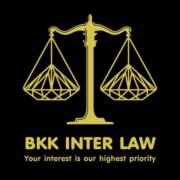Best Corporate Governance Lawyers in Don Mueang
Share your needs with us, get contacted by law firms.
Free. Takes 2 min.
List of the best lawyers in Don Mueang, Thailand
About Corporate Governance Law in Don Mueang, Thailand
Corporate governance refers to the systems, principles, and processes by which companies are directed and controlled. In Don Mueang, a district of Bangkok, Thailand, corporate governance standards adhere to both national legislation and local best practices. Businesses operating here, whether they are large corporations or small to medium-sized enterprises, are expected to comply with Thai corporate law, regulations from regulatory bodies, and ethical norms to promote transparency, accountability, and long-term business success. Good corporate governance in Don Mueang helps protect the interests of shareholders, employees, customers, and the wider community.
Why You May Need a Lawyer
Navigating the complexities of corporate governance can be challenging, especially as laws and regulations are frequently updated. There are several situations in which individuals or business owners in Don Mueang might seek legal assistance with corporate governance issues, such as:
- Establishing a new company or restructuring an existing entity
- Ensuring compliance with local and national corporate laws
- Drafting or reviewing shareholder and board agreements
- Handling disputes between shareholders, directors, or other stakeholders
- Receiving guidance on annual meetings and company reporting requirements
- Investigating potential breaches of duty or regulatory non-compliance
- Addressing conflicts of interest or insider trading concerns
- Managing mergers, acquisitions, or dissolutions
A lawyer can provide practical advice, assist with documentation, mitigate risks, and represent your interests in front of the relevant authorities or courts.
Local Laws Overview
In Don Mueang, corporate governance is primarily governed by the Civil and Commercial Code of Thailand, the Public Limited Companies Act, and various regulations issued by the Department of Business Development (DBD) and the Securities and Exchange Commission (SEC) for listed companies. Key aspects include:
- Minimum requirements for the establishment and registration of companies
- Obligations for companies to hold annual general meetings (AGMs) and keep accurate records
- Rules regarding the roles and responsibilities of directors and shareholders
- Regulations on conflict of interest and related-party transactions
- Requirements for disclosure and transparency in financial reporting
- Penalties for non-compliance with governance standards
- Local adaptations, such as specific Don Mueang business licensing requirements
Legal compliance is closely monitored, and violations can result in fines, reputational damage, or even criminal charges in severe cases.
Frequently Asked Questions
What is corporate governance and why is it important in Don Mueang?
Corporate governance is the framework of rules and practices that ensures a company’s integrity and accountability. In Don Mueang, it helps businesses build trust with stakeholders and comply with both local and national regulations.
Who is responsible for corporate governance in a company?
The board of directors is mainly responsible for overseeing corporate governance. However, company management, shareholders, and sometimes external advisors also play crucial roles.
What are some common legal requirements for companies in Don Mueang?
Companies must register with the Department of Business Development, maintain accurate corporate records, convene annual general meetings, and comply with financial disclosure obligations.
Are there specific rules for foreign-owned companies?
Yes, foreign-owned companies may face additional restrictions or licensing requirements under the Foreign Business Act. They must also adhere to standard governance and reporting regulations.
How often do we need to hold board or shareholder meetings?
At a minimum, companies must hold one annual general meeting per year, but the board may meet more frequently depending on the company’s needs and its articles of association.
What happens if a company does not comply with governance laws?
Non-compliance can result in administrative fines, suspension of business licenses, or legal prosecution against responsible directors or executives.
Is it necessary to have a Thai national as a director?
Thai law does not require companies to have a Thai director, but some sector-specific rules or company policies might require local representation.
How can conflicts between shareholders or directors be resolved?
Disputes can often be resolved through negotiation or mediation, but serious conflicts may require legal action, arbitration, or intervention by local authorities.
Are there special governance rules for listed companies?
Yes, companies listed on the Stock Exchange of Thailand must comply with stricter requirements as set by the Securities and Exchange Commission, including additional disclosure and transparency standards.
Why should I consult a lawyer instead of handling governance matters on my own?
A qualified lawyer ensures that your corporate governance processes fully comply with current laws, minimizes legal risks, and can help you avoid costly mistakes or penalties.
Additional Resources
If you need more information or support, consider the following resources in Thailand:
- Department of Business Development (DBD) - Ministry of Commerce
- Securities and Exchange Commission (SEC) Thailand
- Thai Institute of Directors
- Bangkok Bar Association
- Thai Chamber of Commerce
- Legal aid centers at local universities
These organizations provide practical information, guidelines, and sometimes free or low-cost legal counseling for individuals and businesses in Don Mueang.
Next Steps
If you are facing a corporate governance issue in Don Mueang, gather relevant company documents, outline your main concerns, and identify your objectives. Reach out to a qualified lawyer specializing in corporate law within the Bangkok area for an initial consultation. Many law firms offer free first consultations or flat-fee legal packages to help you understand your options. Timely and informed legal advice can help ensure your business remains compliant, avoids penalties, and builds a reputation for integrity in the local market.
Lawzana helps you find the best lawyers and law firms in Don Mueang through a curated and pre-screened list of qualified legal professionals. Our platform offers rankings and detailed profiles of attorneys and law firms, allowing you to compare based on practice areas, including Corporate Governance, experience, and client feedback.
Each profile includes a description of the firm's areas of practice, client reviews, team members and partners, year of establishment, spoken languages, office locations, contact information, social media presence, and any published articles or resources. Most firms on our platform speak English and are experienced in both local and international legal matters.
Get a quote from top-rated law firms in Don Mueang, Thailand — quickly, securely, and without unnecessary hassle.
Disclaimer:
The information provided on this page is for general informational purposes only and does not constitute legal advice. While we strive to ensure the accuracy and relevance of the content, legal information may change over time, and interpretations of the law can vary. You should always consult with a qualified legal professional for advice specific to your situation.
We disclaim all liability for actions taken or not taken based on the content of this page. If you believe any information is incorrect or outdated, please contact us, and we will review and update it where appropriate.









